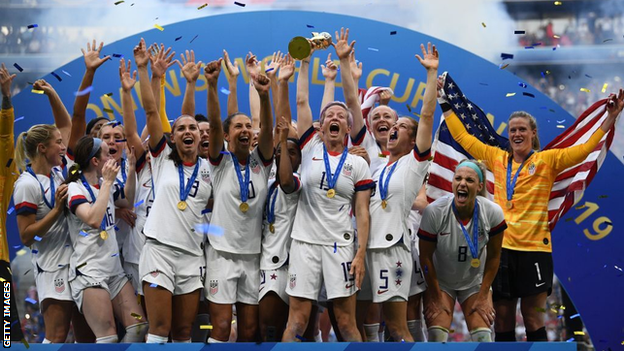Women's football: Prejudice & abuse 'major issues' - Fifpro
- Published

The USA won the 2019 Women's World Cup - where 186 players were surveyed by Fifpro
Prejudice towards women playing football is "continuous across many regions of the world" and too many face adverse labour conditions, says world players' union Fifpro.
In a report released on Thursday, Fifpro found "discrimination, sexual harassment and abuse" are major issues.
The union also surveyed 186 players from the 2019 World Cup.
Of those, more than half said there are not enough support staff at clubs.
The union called for the introduction of global standards for players as they say adverse labour conditions "still plague the women's game".
Of the 186 elite women's players questioned in the survey last year, 51% said there were not enough staff at their club to fulfil their playing needs.
From the same cohort, 41% said they do not receive health insurance from their club, while only 3% received help to relocate after a transfer and 17% said they receive no non-financial benefits from their club.
The report also highlighted issues with facilities for women's teams in Colombia, one of the countries bidding to host the Women's World Cup in 2023.
Colombian player's union Acolfutpro found in 2019 that eight out of the 20 training pitches used by teams in the Colombia women's professional league "were not suitable for professional football", with some without grass, changing rooms or showers.
Asked how he felt about those findings given Colombia hopes to host the World Cup, Fifpro general secretary Jonas Baer-Hoffmann told BBC Sport: "There are always two ways of looking at this. On the one hand, that doesn't give a very good indication that they're up to it.
"On the other hand, the question is, would a move to bid [for the tournament] now lead to improved conditions? We have to see what the reality is.
"Overall there is no question that the playing conditions in Colombia are really, really difficult, not just for the women but the men also."
Bids to host the 2023 event have also been put forward by Japan and Brazil, as well as a combined bid from Australia and New Zealand.